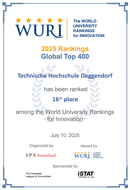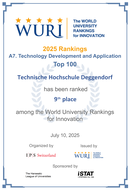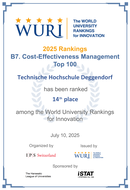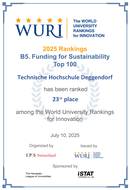deggendorf institute of technology
pioneering and vibrant
university Portrait
Founded in 1994, our multi award-winning university has become the most successful newly founded University of Applied Sciences in Bavaria. We believe this is due to our vision which has always been at the forefront of our development strategy: we have continuously developed attractive fields of study supplemented by a range of further education courses, generated intensive research, knowledge and technology transfer to modern economy, followed economic and social trends, and developed a vast regional and international network.
1. Quality of Life and Study Experience
Studying at DIT is the best time of your life. We support our students in balancing study, work, and leisure for a high quality of life. We develop flexible and innovative study formats and use diverse teaching methods. Our campuses are designed with students to be places for both social learning and relaxation. We also organize events and promote sports and cultural activities for our students.
2. Internationality and Integration
With students from over 100 nations, DIT is one of the most international universities in Germany. We offer unique intercultural learning environments and prepare students for global challenges through international programs, study groups, and modules. We ensure that both international and local students feel welcome and valued. We counter exclusion with team-building measures and foster a sense of community. We support our students from their arrival at DIT to their successful job applications.
3. Practical and Demand-Oriented Training
As an educational partner in East and Lower Bavaria, we are dedicated to training specifically for the needs of regional businesses. Practical and demand-oriented training is our core task. International students are introduced to companies early on through intensive language courses and dual study programs. This leads to excellent employment opportunities in the region and beyond.
4. Applied Research, Transfer, and Start-Ups
DIT stands out for its research strength and experience in start-ups compared to other universities. This is reflected in the courses and additional offerings for our students. Master's programs are closely linked to the research competencies of our technology campuses and research groups, providing excellent starting conditions for scientific careers and further doctoral studies. Entrepreneurial students find a start-up-oriented environment with relevant course content and extensive additional services.
5. Quality
DIT continuously works on developing a unified understanding of quality in teaching. The best applicants are admitted through suitability tests and can study at DIT in an attractive and performance-oriented learning environment. All lecturers are involved in the process of continuous quality improvement. We regularly measure and evaluate our teaching quality and develop our teaching formats, content, and methods based on these results.
about deggster

What's perfectly normal in sports may seem a little odd at a German university: the mascot. But Deggendorf Institute of Technology is ambitious to always play in the premier league, that's why it has a mascot too: The Deggster. With ggs instead of x, because he's quite a nice guy. Even if some may spontaneously mistake him for a tiger, the Deggster is actually a panther. That's because the (red) panther is the (only) heraldic animal of Lower Bavaria. Surprise, because many people would probably instinctively name the lion as THE Bavarian cat.
The Deggster has been around since 2021 - as a key fob and in real life. Well, almost. Because there is always a mysterious person at every event who slips into his two-metre tall, South American robe. Nice and cosy in winter, hot as hell in summer. Nevertheless, the Deggster is always friendly and, as a university icon, adorns countless selfies on all kinds of social networks in the western and eastern hemisphere. It is even rumoured that he became the most photographed personality in DIT history in his early years.

Perhaps for this reason - but we don't know for sure - the Deggster was also honoured with its own decorative seal. On it, it can be seen in a highly stylised form together with its blue colleague, which stands for Upper Bavaria as well as Lower Bavaria. And here it comes: both the blue and the red panther in elegant and sublime black. Which, by its very nature, is a better colour for the panther. The seal also honours the city of Deggendorf and the state of Bavaria with its coat of arms and diamond pattern. As befits a decidedly international university, the seal includes both its German and English names: ‘Technische Hochschule Deggendorf’ and ‘Deggendorf Institute of Technology’.
rankings, awards, certificates & memberships
rankings
WURI (World University Rankings for Innovation)-Ranking
2025:
- No. 16 worldwide in the category "Global Top 400 Innovative Universities"
- No. 9 worldwide in the category "Technology Development and Application"
- No. 14 worldwide in the category "Cost-Benefit Management"
- No. 23 worldwide in the category "Empowering Professionals: Education for a Sustainable Tomorrow"
2024:
- No. 16 worldwide in the category ‘"Leadership"
- No. 20 worldwide in the category "Global Top 300"
- No. 24 worldwide in the category "Generative AI Application"
- No. 28 worldwide in the category "Student Mobility and Openness"
2023:
- No. 1 worldwide in the category „Entrepreneurial Spirit“
- No. 16 worldwide in the overall ranking of the most innovative universities
- Most innovative university in Germany
2022:
- No. 2 worldwide in the category „Entrepreneurial Spirit“
- No. 8 worldwide in the category „Crisis Management“
- No. 33 worldwide in the category „Industrial Application“
- No. 51 worldwide in the category „Student Mobility and Openness"
- No. 24 worldwide in the category „Real Impact"
2021:
- No. 5 worldwide in the category "Entrepreneurial Spirit"
- No. 7 worldwide in the category "Crisis Management"
- No. 29 worldwide in the category "Industrial Application"
- No. 29 worldwide in the overall ranking of the most innovative universities
2019:
- No. 8 worldwide in the category "Entrepreneurial Spirit"
- No. 26 worldwide in the category "Student Mobility and Openness"
- No. 43 worldwide in the overall ranking of the most innovative universities
CHE university rankings
2023/24 ranked as outstanding in:
- Business Administration
- International Management
- Tourism Management
- Organisational and Economic Psychology
- Industrial Engineering
- Business Informatics
2019/2020 ranked as outstanding in:
- Civil and Construction Engineering
- Electrical Engineering and Information Technology
- Mechanical Engineering
- Mechatronics
- Engineering Physics
2023: DIT is one of the best state universities in Germany according to the study "Deutschlands Beste" (Germany's Best) in cooperation with Focus and Focus Money.
awards
- Certificate "Herausragende Ausbildungsleistung 2025" - IHK Niederbayern
- Award "Top-Arbeitgeber im Mittelstand 2024" (Top employer in the SME sector 2024)
- Award "Arbeitgeber der Zukunft" (Employer of the future) 2023
- European Society for Quality Research: International Diamond Price for Excellence in Quality 2023
- ACEEU Triple-E Award: #4 in Europe in "Young Entrepreneurial University of the Year" (From Technology to scale: Full 360° Mission)
- Prof. Peter Schmieder: Triple-E-Award „Male Entrepreneurial Leader of the Year“ 2022
- Proudr LGBTIQ+ Campus Index for Germany, Austria and Switzerland, 2021. Placed no. 4 with a result of 79,7%
- ESPA Innovation Award 2019
- Winner of the "Zwei-Länder-Preis" 2019
- Winner of U-Multirank award as top 25 worldwide in the category " Contact to work Environment" 2019
- Winner of U-Multirank award as top 25 universities worldwide in the category " International Orientation of Degree Programmes" 2019
- Winner of the MINTernational Best Performance Prize 2018
- Winner of the National Employer Prize for Education 2013
certificates
- The European Campus got certified in 2023 as bicycle-friendly employer
- E-Quality Label certificate, ensuring equal opportunities
- National Code of Conduct for German Universities certificate, regarding international students


academic institutional memberships
- Heroes Alliance
- MINT Zukunft schaffen (STEM initiative)
- Affiliate member of the United Nations World Tourism Organization
- Member of the European University Association
- Member of Families in the University best practise club
- Hydrogen Alliance Bavaria
The European Campus Rottal-Inn is an academic institutional member with the following top professional societies in Digital Health:
- Healthcare Information and Management Systems Society (HIMSS)
- International Society for Telemedicine and eHealth (ISfTeH)
- International Medical Informatics Association (IMIA)
- European Federation for Medical Informatics (EFMI)
vision 2030 - 10,000+ students
1. digitalisation
A centre for digitisation technology is our vision for the digital transformation of the Bavarian economy.
2. health
We strengthen the health care market through suitable academic courses and our goal is to shape the future of the health care industry.
3. mobility
Mobility is an essential element to success, especially in rural areas, which we strengthen through our intensive research and technology transfer.
4. sustainability
Sustainability interconnects all degree courses and areas of study out of humility and respect for future generations.
5. internationality
Our university is without borders, we have a vast range of partner universities around the globe and our students represent over 100 nations.
6. knowledge and technology transfer
Essential in growth areas and relevant research topics with and for our business partners.
7. further education courses
We are a reliable and innovative institute for life long learning parellel to full-time work at any age
8. startup campus
We will provide you with all the knowledge you need as an entrepeneur: a suitable degree, advise and support, scholarships and innovation labs.
9. quality of education
Our alumni are proof of our exceptional standard of education and innovative teaching methods. They are in professions all around the globe, we're very proud of them.
dit milestones
2025
Opening of the Campus Wörth-Wiesent
Opening of the Campus Kemnath
2024
Opening of the BITZ Transformation Lab in Oberschneiding
Opening of the Promotionszentrum NITRO
Opening of the Promotionszentrum DigiTech
Prof. Waldemar Berg takes over as University President on 15 March
2023
Opening of the Technology Campus Vilshofen
10 years Technology Campus Grafenau
Laying of the foundation stone for the extension in Cham
Richtfest des Erweiterungsbaus Mensa
University milestone: Opening of new facilities in the Veilchengasse in Deggendorf
2022
In June, the DIT awards the Anton Fink Science Prize for Artificial Intelligence for the first time
20 years of the Centre for Academic further education
2021
8,324 students for the winter term 2021/2022
Campus Cham becomes third study location at DIT
Opening of the Bavarian Innovation and Transformation Centre (BITZ) Oberschneiding
2020
DIT receives system accreditation
Opening of the Technology Campus Plattling
Decision to open another Technology Campus in Vilshofen in 2022 with focus on cyber security
DIT becomes the only university of applied sciences in Germany with a European Grouping for Territorial Cooperation (EGTC)
2019
7,158 students for the winter term 2019/20
Foundation of the Faculty of Applied Computer Science (AI)
Establishment of the Faculty of European Campus Rottal-Inn (ECRI)
Opening of the Technology Campus Parsberg-Lupburg
Opening of the Technology Campus Hutthurm
Opening of the Technology Campus Teisnach II
DIT's 25th jubilee festival
2018
Opening of the Transfer Centre for Technology and Innovation on 7 June as the fifth building in a major extension project
2017
Prof. Dr. Peter Sperber is elected to carry on his presidentship for the second successive term
2016
The new campus building for TC Grafenau is opened
Student population in Oct 2016: 6,068
2015
Founding of the European Campus Rottal-Inn in Pfarrkirchen, courses start on 1 Oct 2015
Technology and Study Centre Weißenburg is opened
Faculty of Applied Healthcare (AGW) is founded
2014
Major campus extension in Deggendorf is opened on 26 Oct 2014, including 4 new buildings over an extended area of 5,700 sqm
2013
Student population in Oct 2013: 5,061
Federal President Joachim Gauck visits Deggendorf as students help locals during a flood catastrophy
New "THD" and "DIT" logos


Awarding of the new titles "Technische Hochschule Deggendorf" and "Deggendorf Institute of Technology"
Technology Campus Grafenau is opened
2012
Heathcare Campus Bad Kötzting is opened
Technology Application Centre Spiegelau is opened
2011
Prof. Dr. Peter Sperber is elected to be the University President, starting March 2012
Faculty of Naturwissenschaften und Wirtschaftsingenieurwesen (NuW) is founded
New “HDU“ logo is created for "Hochschule für angewandte Wissenschaften Deggendorf" and "Deggendorf University of Applied Sciences"
Campus Schloss Mariakirchen is opened

2010
Student population in Oct 2010: 4,052
Technology Campus Cham is opened
2009
Technology Campus Teisnach is opened
Technology Campus Freyung is opened
2008
Visit from Bundeskanzlerin Angela Merkel
2007
Student population in Oct 2007: 3,159
German degree titles are adjusted to Bachelor und Master titles for international transparency
2006
Faculties are established
2003
Student population in Oct 2002: 2,146
2002
The Further Education Centre is established
“Fachhochschule Deggendorf“ logo is redesigned

2001
Innovation and Technology Campus Deggendorf (ITC 1) is opened
1999
Student population in Oct 1999: 1,121
Development of the R&D labs, cooperative doctorates
On 1 Oct 1999 virtual teaching methods begin (IT compact course, E-Learning)
1998
“Fachhochschule Deggendorf“ logo is developed

1997
On 24 April 1997 a foundation stone for the new campus is laid
1996
Prof. Dr. Reinhard Höpfl is elected to be University President
1994
The university is founded with the title of "Fachhochschule Deggendorf - Hochschule für Technik und Wirtschaft"

1991
On 26 Nov 1991 the Bavarian Council of Ministers decide to establish a university in Deggendorf
stats & facts
Stats and facts gives you an overview of various key figures, evaluated regularly on fixed key dates. Please direct any enquiries to pressestelle@th-deg.de.
9,476 Students
222 Professors
1,221 Staff members
52 Doctoral candidates
57 Bachelor degree programmes
44 Master degree programmes
Student numbers as of 07.10.2025
Staff numbers as of 01.10.2025
dit's mission and guiding principles
For over 30 years, Deggendorf Institute of Technology has been a reliable partner for students, companies, schools, research institutions, and municipalities while also providing a professional home for its staff.
We stand for practice-oriented teaching, applied research and development, and the transfer of knowledge to society.
We are aware of the challenges of our time and align our actions accordingly.
We are characterised by mutual respect, openness to the world, cultural diversity, dynamic development, democratic values, equal opportunities, and diversity.
As a responsible actor and key driver in the region, DIT significantly contributes to the development of the innovation ecosystem. We build bridges between national and international research institutions, municipalities, companies, and start-ups, actively shaping the future of our region.
We are pioneers
In teaching, further education, applied research, and start-up support, we are pioneers in the higher education landscape. The openness to new target groups and the continuous dialogue with society, politics, and business shape the development of our university. Innovative teaching and learning environments and the pursuit of excellence in research are key to our success.
Our principle is continuous improvement
We provide our students with excellent conditions through practice-experienced scientists and service-oriented administration to bring out their individual potential. We align our teaching and learning offerings with the needs of the economy and continuously develop them further.
As part of our excellent offerings in teaching, further education, research, and start-up support, we promote social and professional skills as well as entrepreneurial thinking and action.
We actively shape the future
The challenges of our time are our guide and drive. Our daily actions shape the future of our region and that of our students and staff. We are always aware of this great responsibility.
Our goal is to actively shape the future. In developing new study programmes, setting research priorities, and promoting founders, we rely on the highest quality and future orientation.
We create working conditions that enable our employees to actively shape the future. We place great emphasis on careful selection and qualification of our staff to ensure they are up to future challenges and contribute positively to the university's development.
dit's mission statement for teaching
The mission statement for teaching reflects the self-concept of DIT and the standards of teaching for the whole university. It provides orientation for all stakeholders at the university, such as lecturers, students, and academic and non-academic staff, concerning the type of teaching and learning embodied by DIT. The following principles describe, in a transparent way and based on the university’s mission statement, the teaching ideals DIT stands for.
1. Value orientation and personality development
The DIT values are always taken into consideration in the further development of study programmes and their implementation. Not only the content but also the didactic and media means reflect the culture of democracy, dynamics, acceptance, respect, tolerance and open-mindedness. In particular the aspiration for a family-like university community and equal opportunities is realised in all areas of research and teaching.
DIT also regards it as its responsibility to prepare the graduates for professional practice and research on an interdisciplinary level. In addition to the technical content, the use of different media and didactic options promotes social, societal and interdisciplinary competences such as communication skills, teamwork, willingness to discuss, social interest, self-reflection and personal initiative.
2. Cosmopolitan education and regional responsibility
DIT sees internationalisation and cultural open-mindedness as central aspects of its future orientation and higher education approach. The study contents and the study organisation enable student mobility, international participation, cosmopolitan cooperation and intercultural communication. Students are encouraged and trained to be able to operate in professional practice both nationally and internationally. DIT aims to develop personalities who can manage intercultural and international research and manage projects in a professional and goal-oriented manner. DIT combines its cosmopolitan approach with close ties to the region. As a central component of the educational and professional development of Lower Bavaria and beyond, regional opportunities, labour market requirements and potential future topics are integrated into the university’s and the educational approach. This way, the education at DIT ensures that the region continues to be a popular place to study, work and live for a long time to come.
3. Future and labour market-oriented education
As a practice-based university with a centre for applied research, DIT always imparts timely, future-oriented and sustainable content. The lecturers incorporate the current findings from research and development as well as the incoming demands and advice from professional practice into the development of the study programmes. The constant exchange with regional, national and international representatives of companies, research and interest groups enables the training of competent and market-competitive graduates. DIT is also committed to promising, innovative and venturesome research and teaching projects in order to address and help shape the current issues of our time.
4. Practice-oriented and innovative imparting of skills
Through close collaboration with companies, authorities, institutions and partners, we aim to achieve and strengthen application-oriented and practical imparting and execution of the skills we provide. Due to the promotion of extra-university and internal collaborations, students acquire professional skills that offer a competitive advantage on the labour market and enable them to enter the market more efficiently.
strategies & Plans
University Target Agreement 2023 - 2027
Like all Bavarian universities, Deggendorf Institute of Technology has concluded a framework agreement for the years 2023 - 2027 with the Bavarian State Ministry of Science and the Arts. The fields of action described therein and their implementation serve to sharpen the strategic profile of the university and its specific focus. The interim report as at 30 June 2025 can be viewed here:
internationalisation strategy 21-23
The claim to be the most international university in Bavaria comes with the responsibility not only to live internationalisation together on a daily basis, but also to constantly put it to the test, to develop it further and to always keep our finger on the international pulse.
This idea naturally also underlies the current internationalisation strategy:
Gender Equality Plan
Deggendorf Institute of Technology (DIT) considers it its responsibility to offer all employees, teaching staff and students an environment that stands for openness, equal opportunities, acceptance, inclusion, and freedom from discrimination. As DIT has a share of ca. 35% international students, it is even more important to establish a culture in which everyone feels included, integrated, and accepted. We see diversity as an opportunity and as the future, which is why we want to offer every single person the same opportunities to develop to the best of their abilities at DIT. This also includes breaking down existing barriers, exclusion mechanisms and discrimination, effectively. Our family-friendly university community stands for equal opportunities regardless of gender, sexual orientation, origin, and religion. We promote cultural diversity, as well as the physical and mental health of our students and employees. Therefore, we commit ourselves and all members to a respectful and sensitive interaction with each other.























